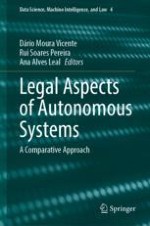2024 | OriginalPaper | Buchkapitel
The Spread of Fake News by Social Bots: Perspectives on Social Bot Regulation
verfasst von : Hugo Soares
Erschienen in: Legal Aspects of Autonomous Systems
Aktivieren Sie unsere intelligente Suche, um passende Fachinhalte oder Patente zu finden.
Wählen Sie Textabschnitte aus um mit Künstlicher Intelligenz passenden Patente zu finden. powered by
Markieren Sie Textabschnitte, um KI-gestützt weitere passende Inhalte zu finden. powered by
